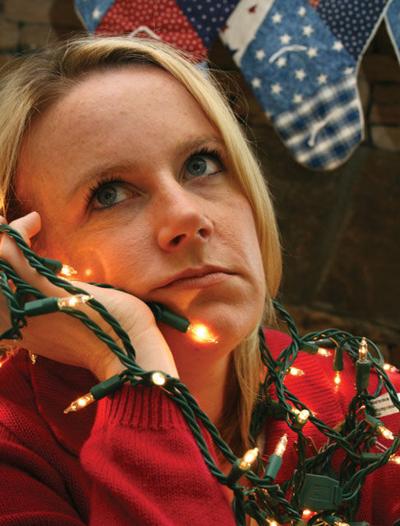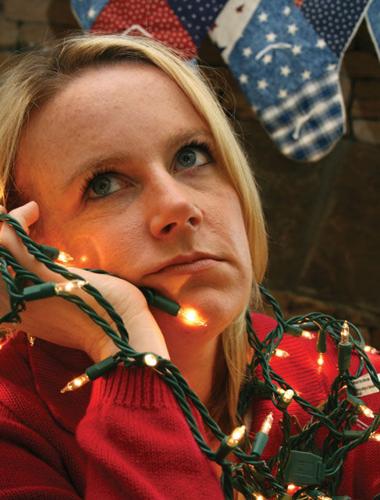Does the thought of everything you have to contend with during the holiday season stress you out? If so, you are far from alone. According to the 2016 Holiday Poll by Consumer Reports, "Almost all of us dread something about the holiday season . . . In fact, only three percent of respondents claimed to dread nothing during this busy time of the year." Last year’s top five dreads were "crowds and long lines, aggressive or thoughtless driving in store parking lots, getting the house back in order, gaining weight and political discussions with certain family members and in-laws."
Sound familiar? The good news is that you don’t have to succumb to the excesses of the season that lead to anxiety. We asked area counselors to share their advice on how to cope with holiday stress and make the season happier and healthier instead.
Lower those high hopes
Yes, we all want to have a perfect holiday season, but perfection is not necessarily an attainable goal. "A lot of people get bogged down with really big expectations, how the house should look, how the food should taste," says Sarah Stukas, owner and psychotherapist at Life Insight in Hinsdale. In all the hype of the season, it’s easy to lose sight of what really matters, which for many people is spending time with family and friends, and in religious observances. She urges people to be intentional with holiday plans by asking: "How do we want this time to go? Is my goal to spend two weeks killing myself to make everything perfect or to connect with my people?"
Too-high hopes can come from both our own expectations of the holidays and those placed on us by family and friends. "I like to give people absolute permission to design their holiday time the way they want to," says Stukas of her counseling sessions. "There is a happy middle ground. You can see people but set boundaries." She followed her own advice by changing her holiday tradition to take a trip with her immediate family over the holidays and to spend time celebrating with others before and after.
Terry Ciszek, director of outpatient and social services at Linden Oaks Behavioral Health in Naperville, also sees stress coming from external expectations to follow certain rituals and traditions year after year. "We need to ask what meaning or what function do those things really serve, and take back ownership of our time, energy and resources. We’re bombarded every day with implications that somehow the holidays should be perfect," he says. "Do the best we can with what we have, and put meaning and relationships in front."
We also put expectations on those close to us that they may not be able to meet. "I often use the analogy that, within our families, we often go to a dry well for water," Ciszek observes. Instead, we would be better off changing our expectations of people who have proven unable or unwilling to fulfill the hopes we have for them.
When dealing with difficult people, Ciszek says, "It’s important for me to stay focused on myself. It’s not my job to change someone else, but to accept them for who they are. If time with them is going to be difficult, avoid time with them." He also recommends that you look to your wider circle of friends for support. "Family is not defined by blood. Family is defined by the relationships I choose."
Children also can experience the burden of expectations and stress during the holidays, both for themselves and for others, according to Eric Nolan, MD, medical director at Northwestern Medicine Behavioral Health in St. Charles. He notes that while children may be glad for the break from school, they often come home loaded with school assignments. Children also may expect "certain gifts or expect parents to spend a certain amount," he says. He recommends setting appropriate expectations early in the season: "Yes, you can have fun, but you need to do your school work."
Don’t overdo it
"Stress is a fact of life," says Dr. Michael Hakimi, a clinical psychologist with Loyola University Medicine in Maywood and Oak Park, who specializes in stress management. When it comes to holiday stress, he offers a range of coping mechanisms:
• "Simplify the holiday traditions.
Not everything has to be so elaborate.
• Acknowledge and don’t ignore negative feelings.
Reach out to family or friends if you’re feeling lonely.
• Set realistic goals.
Things don’t have to be perfect.
• Have a budget.
If you have financial concerns, set a budget that is realistic and don’t charge up your credit cards.
• The holidays are not the time to discuss family issues.
Set aside your grievances.
• Plan ahead for the things you want to do.
If there are things you don’t want to do, don’t be afraid to say no, instead of saying yes and over-stressing yourself.
• Don’t overindulge yourself with food and drinks.
• Set aside some relaxation time.
• Learn to express gratitude.
Be grateful for all the blessings in your life. Focus on what you have, not what you don’t have. Express gratitude to all the people in your life. Feeling gratitude and not expressing it is like having a wonderful gift for someone and not giving it to them."
Take care of yourself
With all the emphasis on taking care of others during the holidays, our own needs often come last. But counselors say that taking better care of yourself throughout the holiday season can help you avoid anxiety and stress.
Stukas poses the question: "How do we feel our best?" She suggests some sort of regular meditation or journaling or movement-oriented meditation like yoga or tai chi. "We function at a much higher level if we can take 10 minutes a day to meditate," she says. Healthy eating is important, too. She also asks: "What kind of foods are we putting in our bodies? Follow the 85 to 90 percent rule of putting good foods in our bodies."
Stukas recommends getting plenty of sleep and doing things you enjoy, such as reading a book, listening to music or spending time with a friend. "When we have a bit of joy, we can handle stress better."
Get help when you need it While everyone deals with stress and anxiety just about every day, the time may come when professional help is needed to get back on the right track, whether during the holidays or after.
"Anxiety and depression are inextricably linked. Anxiety can roll into depression," observes Nolan. He proposes scheduling an assessment with a psychiatrist, psychologist or counselor when you can no longer meet your regular obligations or you are not able to do what you would normally do.
Ciszek points to symptoms of extreme stress such as exhaustion, irritability and sleeplessness. Dr. Hakimi describes both physical and emotional symptoms, including fatigue, migraines, chest pain, rapid heart rate and loss of sex drive, along with feeling overwhelmed, sad or hopeless, lonely or isolated, constantly worrying, and performance issues on the job.
Area hospitals, including Loyola University Medical Center, Edward-Elmhurst Health’s Linden Oaks, and Northwestern Medicine’s Central DuPage Hospital and Delnor Hospital offer a range of counseling therapies, support groups and inpatient and outpatient mental health care. Private practices such as Life Insight and others also offer counseling and support groups.
Even if you’re not ready to get professional help, you can always go to your closest friends and family members when you’re feeling overwhelmed. "It’s important to ask for help," Ciszek asserts. "So many of us are independent cusses. But doing things together can have meaning and purpose."
De-stressing Difficult Situations
Most of us associate the holidays with happy times, but everyone suffers losses through the course of life, which can make the holidays painful.
"So many people we work with are grieving," notes Sarah Stukas of Life Insight. She encourages people to acknowledge the losses that those close to them have experienced in recent years, such as the death of a loved one.
"The first holidays, anniversaries or birthdays are acknowledged, but it’s usually year two or three that are not. Don’t be afraid to say something," says Stukas. She gives this example: "I don’t know what would be helpful to you this year. Would you like us to spend time with you, bring food or go to midnight mass together?"
If you are experiencing a loss yourself, you may resent the pressure to be in a cheerful mood. "Ignoring negative feelings often contributes to stress," says Dr. Michael Hakimi, a clinical psychologist with Loyola University Medicine. Seeking help from friends or a counselor allows us to deal with negative feelings in a healthier way.
For people who are recovering from drug or alcohol addiction or eating disorders, holiday parties can be danger zones. Ciszek suggests following 12-step rules around parties. "Go late and leave early," he says. "If you are obligated to go to a party, check in with a support person before you go or text them during the party." He encourages hosts who know that they will have guests who are dealing with addiction issues to consider having an alcohol-free party or offering a section of healthy foods that will not be a temptation.
Dr. Eric Nolan of Northwestern Medicine Behavioral Health advises hosts of holiday gatherings to get in touch with their own limitations, make self-care a priority, and set realistic expectations. "I personally have 14 people coming to stay in my house for Thanksgiving. I have told them, ‘I am not going to make breakfast, lunch and dinner every day. Here’s what we are going to do.’" Setting an agenda and asking for help, whether from a professional or friends and family, can go a long way toward lowering anxiety levels and spreading holiday cheer.




(0) comments
Welcome to the discussion.
Log In
Keep it Clean. Please avoid obscene, vulgar, lewd, racist or sexually-oriented language.
PLEASE TURN OFF YOUR CAPS LOCK.
Don't Threaten. Threats of harming another person will not be tolerated.
Be Truthful. Don't knowingly lie about anyone or anything.
Be Nice. No racism, sexism or any sort of -ism that is degrading to another person.
Be Proactive. Use the 'Report' link on each comment to let us know of abusive posts.
Share with Us. We'd love to hear eyewitness accounts, the history behind an article.